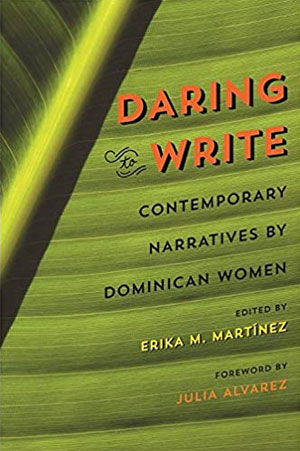Daring to Write: Contemporary Narratives by Dominican Women

Buy Now:
Daring to Write: Contemporary Narratives by Dominican Women
Available from the University of Georgia Press (April 15, 2016)
By Erika Martínez (Editor), Julia Alvarez (Foreword), Rhina Espaillat (Contributor), Leonor Suarez (Contributor), Ana-Maurine Lara (Contributor), Yalitza Ferreras (Contributor), Nelly Rosario (Contributor), Marívell Contreras (Contributor), Kersy Corporan (Contributor), Angie Cruz (Contributor), Carolina Gonzalez (Contributor), Juleyka Lantigua-Williams (Contributor), Jina Ortiz (Contributor), Sofia Quintero (Contributor), Delta Eusebio-Pol (Contributor), Noris Eusebio-Pol (Contributor), Farah Hallal Muñoz (Contributor), Ángela Hernández Núñez (Contributor), Miriam Mejía (Contributor), Riamny Méndez (Contributor), Jeannette Miller (Contributor), Sheilly Núñez (Contributor), Lissette Rojas-Berroa (Contributor), Ludin Santana (Contributor), Dulce Reyes-Bonilla (Contributor), Luisa A. S. Vicioso (Contributor)
With this new Latino literary collection Erika M. Martínez has brought together twenty-four engaging narratives written by Dominican women and women of Dominican descent living in the United States. The first volume of its kind, Daring to Write’s insightful works offer readers a wide array of content that touches on a range of topics: migration, history, religion, race, class, gender, and sexuality. The result is a moving and imaginative critique of how these factors intersect and affect daily lives.
The volume opens with a foreword by Julia Alvarez and includes short stories, novel excerpts, memoirs, and personal essays and features work by established writers such as Angie Cruz and Nelly Rosario, alongside works by emerging writers. Narratives originally written in Spanish appear in English for the first time, translated by Achy Obejas. An important contribution to Latino/a studies, these writings will introduce readers to a new collection of rich literature.
~~
Daring to Write gathers in one volume and for the first time Dominican women writing across genres and against gender norms and borders of all kinds. The result is a moving and imaginative critique of how gender, race, and class intersect in the daily lives of women in the Dominican Republic and in the diaspora. This book is an important contribution to women's studies and Latino/a studies. (Daisy Hernández, coeditor of Colonize This! Young Women of Color on Today's Feminism)
Be prepared for a feast, and then, as with all such blessings of plenty, share it: tell others about this book, put it on your syllabi, on the shelves of your bookstores and libraries. Nourish yourself and others with the rich and savory sancocho of the work collected here. As we Dominicans say when a visitor arrives at mealtime, ¡A buen tiempo! Readers, you have indeed come at a good time. (Julia Alvarez, from the foreword)
A scrupulously curated and a vividly brilliant anthology; in its entirety it is a full-throated song, a treasure chest, a diamond, a spell. (Junot Diaz, author of This Is How You Lose Her)
For teachers, this collection complicates and expands our understanding, and gives us insight into the lives and stories of Dominican women, including the ones in our classrooms, as well as those of their mothers, grandmothers, aunts, and sisters. The book also makes new writers available to teachers, many of whom are published here for the first time in English. . . . The stories and narratives also provide wonderful models for young writers to begin telling the stories of their own lives. The book would be a great addition to any classroom library, as the real value of this collection will be realized when we make it available to our students. Erika Martinez created this book for the young woman she was, and for other young women like her, so that they could see themselves reflected in literature, partly so they could know they were not alone, but more importantly because she hoped to encourage them to speak in their own voices, to be inspired to also dare to write. (Meg Petersen, National Writing Project)
The anthology serves up more than a brief taste. It’s a necessary and fully satisfying sampling of Dominican women’s voices. (Donna Miscolta, Seattle Review of Books)
Aside from widening the readership of Dominican women writers by publishing previously untranslated narratives written in Spanish, Daring to Write should be commended for including various genres and emerging writers. The myriad themes represented in the twenty-five narratives relate to many disciplines, and the anthology promises to be an important contribution to Latino/a studies and women’s studies. (Megan Jeanette Myers, Latino Studies)





